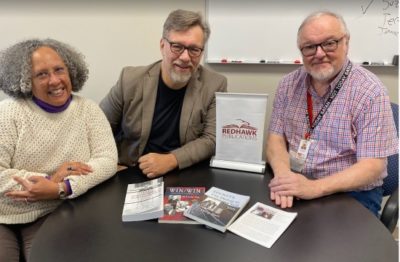
|
|
The NC COVID-19 Student Response Corps (Response Corps) is a partnership between the NC Office of Strategic Partnerships (NC OSP), Lead for North Carolina/UNC School of Government, and nonprofit organizations. Since the launch of the program, the Response Corps has placed over 185 students in internships at over 100 North Carolina nonprofit organizations and governmental entities.
The Response Corps was launched in spring 2020 to address the increased need for organizational capacity among nonprofits and local governments. In a statement about the Response Corps, Gov. Roy Cooper highlighted, “COVID-19 is testing local governments and nonprofits as they work to meet the needs of people in their communities. Through these public service internships, students gain valuable on-the-job experience and local governments, and nonprofits gain extra help when they need it most.”
‘The power and impact of government-university partnerships’
In the spring of 2020, amidst the uncertainty of their professional futures, many college students struggled as internships and job opportunities were canceled or postponed.
That same spring, college and university leaders met with representatives from state agencies to discuss possibilities to connect students with high-impact internships. At about the same time, a statewide survey conducted by NC OSP and the NC Center for Nonprofits revealed hundreds of organizations interested in hosting interns in addition to the potential local government hosts.
Career services representatives from UNC System schools, independent colleges and universities, and community colleges encouraged students to apply for the internship opportunities. To assist program participants and partners further, the college and university representatives also helped host sites identify potential matches.
“The NC COVID-19 Student Response Corps continues to demonstrate the power and impact of government-university partnerships and cross-sector collaboration,” said Patrick Woodie, president of the NC Rural Center.
Woodie went on to say the Response Corps has “strengthened the state’s talent pipeline, increased the capacity of programs that support North Carolinians, and demonstrated the convening and partnership role that state government can play to address challenges that stretch across multiple sectors.”
‘I have not been able to get this hands-on experience before.’
Ultimately more than 120 students would serve as interns in the first year with 60-plus students participating in 2021, the second year of the program.
In 2021, The A.J. Fletcher Foundation and the John M. Belk Endowment each provided a $25,000 grant to ensure compensation for every Response Corps intern. Host organizations providing unpaid internships through the Response Corps were eligible to receive a stipend of up to $1,000 per intern.
With the many different participating organizations, these interns acted in a variety of roles.
Mohammadi Amena is a student at East Carolina University. Amena worked with the International Committee for the Promotion of Investment, Valorisation, Innovation and Employment (CIPIVIE), an organization dedicated to providing “essential, life-saving contributions” to areas of the Democratic Republic of Congo and The Republic of Congo‐Brazzaville.
Amena shared that she was “very scared” when she first accepted the internship offer as one of her assignments included grant writing. In time, however, she enjoyed the research and writing components of producing a grant, so much so that she stayed on after her internship concluded to help see the grant across the finish line.
Amena also took advantage of the professional resources provided by the Response Corps. As with the first year, there was a two-day training with instructors from higher education entities and state government practitioners. One of the sessions was on grant writing, which helped Amena navigate the grant writing process. Additional training opportunities included a weekly speaker series with leaders from across the state. Participants were able to have small group conversations about potential career paths and how to leverage their experience as a member of the Response Corps when seeking future opportunities.
“It was definitely a worthy and a valuable experience for me as I have not been able to get this hands-on experience before,” shared Amena. “I am now very excited to start the journey after knowing how CIPIVIE and this project will improve the lives of so many people — and how it can potentially save lives.”
Host organizations ranged from those promoting public health to organizations combatting food insecurity.
Some host organizations ended up interfacing with interns across multiple organizations. Martha Zimmerman from the Western North Carolina Falls Prevention Coalition hosted multiple interns as part of the coalition’s participation in the project, while also hosting interns as part of her involvement with the St. John’s Community Church Garden.
The impacts of the pandemic created a surge of need for the garden and the associated food pantry. The pantry went from serving 50 families per week in 2020 to an average of 120 families per week in 2022. Zimmerman illustrated the impact her interns had on her organization. She highlighted interns assisting in harvesting and collecting flowers “to take to [their] local tailgate market to raise money to help offset the cost of the Broad Fork, the fencing to help control the critters, and pay for the organic compost.” Through this experience, Zimmerman explained the benefits of the Response Corps for the interns — from learning effective farming practices to seeing firsthand the importance of their work for the food pantry.
What’s next?
In January 2022, the Response Corps was confirmed for a third year. The NC OSP and Lead for North Carolina/UNC School of Government named Zane Carroll, a Lead for North Carolina fellow, as the program’s coordinator to work with higher education partners and internship host sites to launch a third cohort.
The Response Corps leverages one of our nation’s greatest assets — students determined to make a difference — and connects the students with organizations in need of additional capacity.
The host organization intern request form for 2022 is currently live. If you are interested in becoming a host organization, submit an intern request form. This form will populate in the Response Corps’ public database that is shared with colleges, universities, and students. Students can apply directly to host organizations here and are encouraged to check back on the database as more opportunities are posted.






